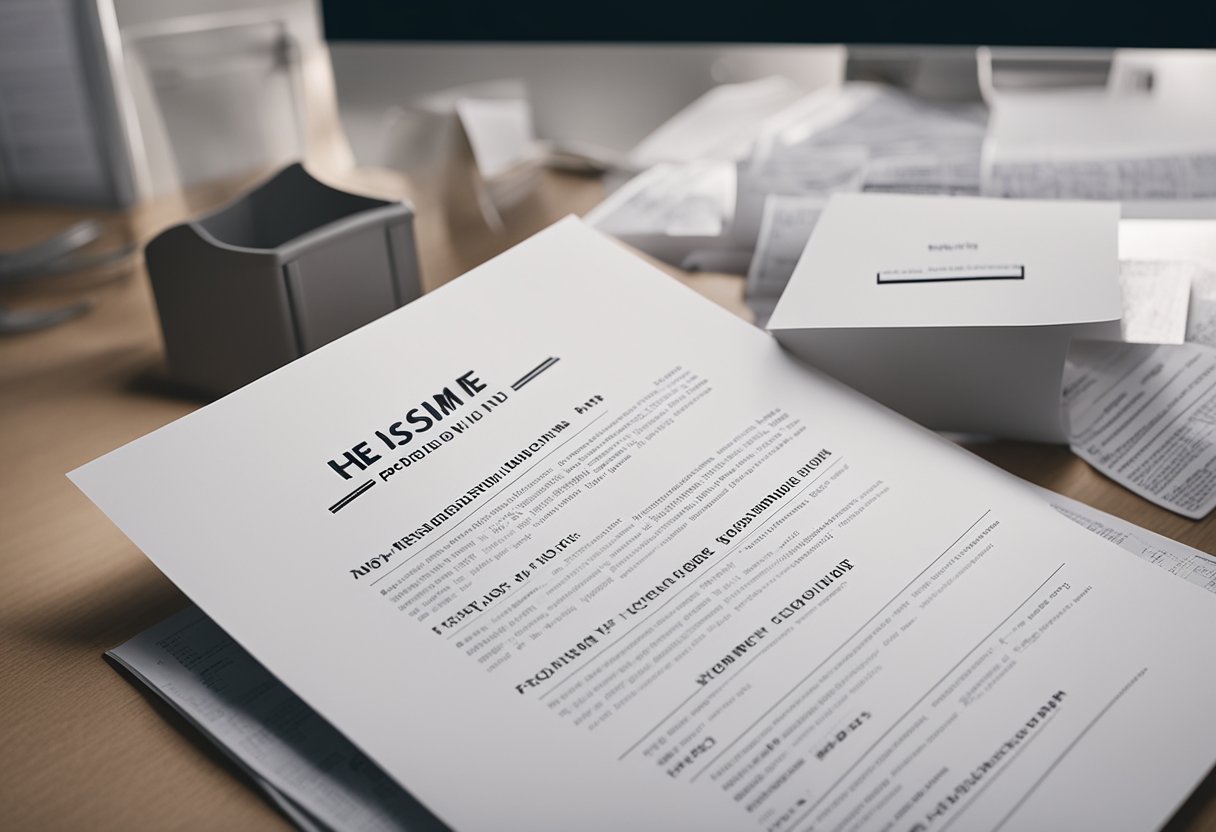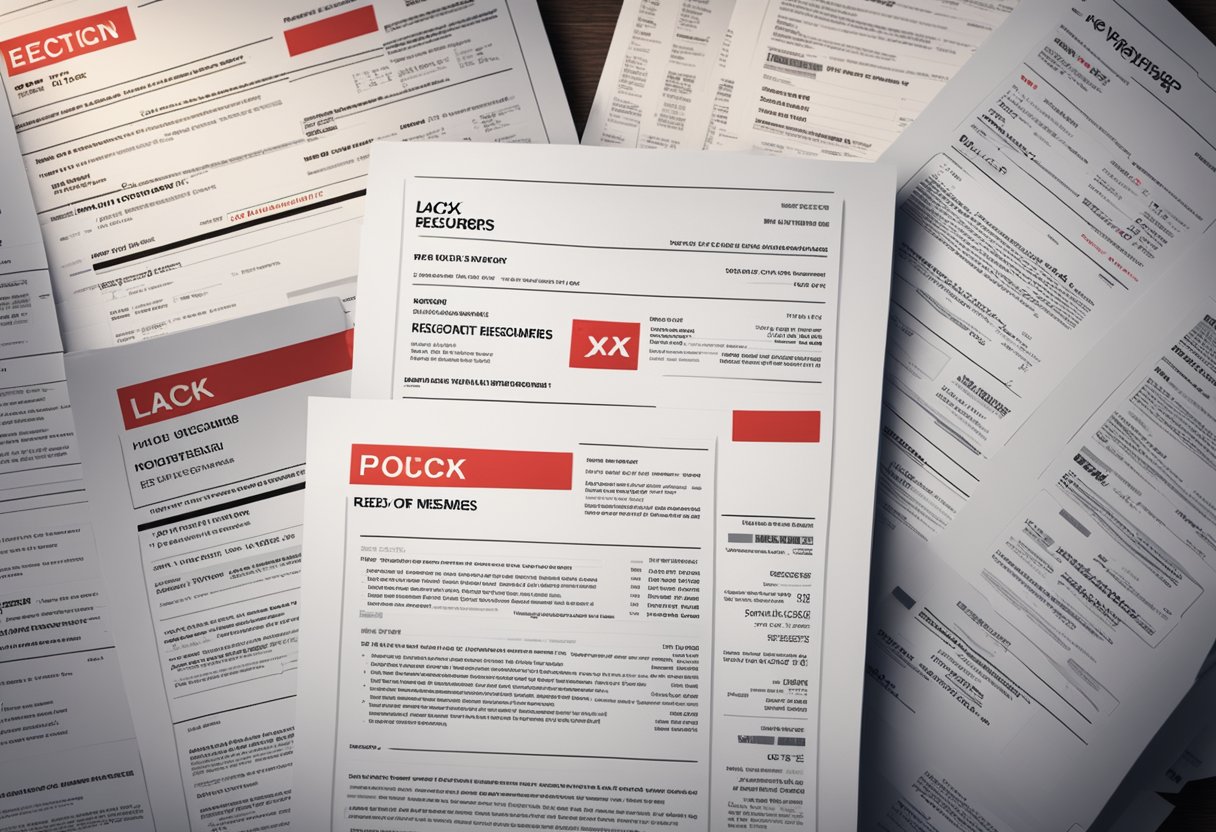Job searching is tough, especially when your resume keeps getting rejected. Even qualified folks run into this problem, which can really mess with your confidence.
The good news? Most resume rejections happen because of small, fixable mistakes.

If you know why recruiters and applicant tracking systems reject resumes, you can really boost your chances of landing interviews. Just a few tweaks to your resume’s format, content, or keywords can make a huge difference in getting noticed by employers.
1. Not Tailoring Resume to Job Description

Sending the same resume for every job application is a classic mistake that gets people rejected. Employers want to see that your resume matches their specific needs.
Each job posting has its own keywords and skills. Many companies use ATS software to scan for these, so generic resumes usually don’t make it through.
Customize your resume for each job. Tweak your work experience, skills, and achievements so they line up with what the employer wants.
A tailored resume tells hiring managers you took the time to understand the role. It shows real interest and helps prove you’re a good fit.
Before you apply, read the job description closely and pick out the key requirements. Highlight your most relevant experience and use similar language in your resume.
2. Lack of Relevant Keywords

Lots of companies use ATS (Applicant Tracking Systems) to filter resumes before a human even looks at them. These systems search for keywords from the job posting.
Missing those keywords is a quick way to get filtered out, even if you have the right skills.
Read the job description carefully and use the same terms in your resume. If the job asks for “project management,” don’t just say “managed projects”—use their exact wording.
Make sure your resume covers both technical and soft skills from the posting. It’s worth customizing your resume for each job, not just sending out the same version every time.
Using a standard resume for every application makes it tough to hit all the right keywords for each role.
3. Overloading with Irrelevant Information
Stuffing your resume with unrelated info just makes it harder to read. Recruiters want to spot relevant skills and experience fast.
Every detail on your resume should have a reason to be there. Random hobbies, super old jobs, or personal details just distract from what matters.
Stick to achievements and experiences that connect to the role you want. Cut anything that doesn’t help prove you’re right for this job.
A focused, clean resume helps hiring managers spot your best qualifications in seconds. They move fast, so you want every detail to count.
Think of your resume as a highlight reel, not your autobiography. Pick the most impressive and relevant stuff that matches the employer’s needs.
4. Poor Formatting and Design
A cluttered or confusing resume usually gets tossed right away. Messy formatting turns off hiring managers who have to sort through piles of applications.
Use simple, professional fonts like Arial or Calibri, size 10-12. Mixing fonts or sizes just makes things look sloppy.
Good spacing and alignment guide the reader’s eye. Don’t cram too much text onto the page or use weird spacing between sections.
Clear headings and bullet points make your info easy to scan. A standard format with organized sections helps managers find what they need quickly.
Leave some white space—don’t try to fill every corner. If your resume looks cluttered, it suggests you can’t prioritize or communicate clearly.
Watch out for basic mistakes like uneven margins or misaligned text. Taking a little extra time to polish the visual side of your resume is worth it.
5. Grammatical Errors and Typos
Spelling and grammar mistakes can ruin your chances instantly. A study showed 77% of hiring managers toss resumes with these errors right away.
Typos make you look careless and inattentive. Even one slip-up can make you seem unprofessional.
Grammar mistakes scattered throughout your resume tell employers you don’t double-check your work. That’s a red flag about your job performance too.
The fix is simple: proofread your resume several times and have someone else look it over. Spell check and grammar tools can catch a lot of issues.
Reading your resume out loud helps you hear awkward phrasing or missing words. Taking a break before your final review gives you a fresh perspective.
6. No Specific Achievements Highlighted
Listing only job duties is a common mistake. Hiring managers want to see what you actually accomplished, not just what you were supposed to do.
Numbers and stats make your achievements stand out. Instead of “managed social media,” try “grew Instagram following by 50% in 6 months.”
Use action verbs to show impact—words like “created,” “increased,” or “implemented” sound way stronger. For example, “reduced customer complaints by 35%” beats “handled customer service.”
Back up your claims with real examples and measurable results. Mention money saved, time shortened, or improvements made.
For each job, include two or three key achievements that are relevant to the position you want. Show off the skills that matter most for this role.
7. Using a Generic Objective Statement
Generic objectives like “seeking a challenging position” just make your resume sound like everyone else’s. These statements waste space and don’t tell employers anything unique about you.
Swap the objective for a professional summary that’s tailored to the role. Highlight relevant skills and achievements that match what the job needs.
Keep your summary short and focused. One or two targeted sentences work best.
Customizing your resume for each position shows initiative. It helps you stand out from other candidates who just copy and paste the same statement everywhere.
A strong summary quickly explains what you bring to the table. Make it interesting enough that the hiring manager wants to keep reading.
8. Inconsistent Employment History
Gaps in your work history can make things harder. Employers want to see steady progress and may worry about unexplained breaks.
Big gaps can raise red flags. The best move is to explain those gaps and focus on what you learned or did during that time.
If you took time off to raise kids, mention the organizational and multitasking skills you picked up. If you were laid off, talk about freelance work, volunteering, or extra classes you took.
Job hoppers—people who switch jobs a lot—might also get extra scrutiny. Employers want to hire folks who’ll stick around for a while.
Just be honest and keep the focus on growth. Listing relevant activities during gaps shows you kept learning and stayed motivated.
9. Failure to Showcase Problem-Solving Skills
Problem-solving ranks as the top skill employers want, with nearly 89% of companies putting it first.
Lots of resumes forget to include real examples of problem-solving. Don’t just list your duties—share stories about challenges you faced and how you tackled them.
Tailor your problem-solving examples to match what the employer values. Highlight times you improved a process, fixed a problem, or found a creative solution.
Numbers and metrics make these achievements pop. For example, “Identified billing system issue and implemented solution that reduced errors by 45%” is way more convincing than just “Fixed billing problems.”
Adding a “Key Achievements” section can help put your best problem-solving wins front and center.
10. Inaccurate Contact Information
Plenty of job seekers miss out because they accidentally put the wrong phone number or email on their resumes. Even a single typo can keep employers from ever reaching out.
Unprofessional email addresses like “partydude123” or “coolchick89” send the wrong message. It just looks careless. It’s way better to use something simple and professional—ideally just your name.
Always double-check your contact info before you send your resume anywhere. Try calling your own number or sending yourself a test email to make sure everything actually works.
Some folks forget to include their phone number or even their city. Missing details like these can make it tough for employers to get in touch or move things forward.
Honestly, it’s smart to put your contact info right at the top of your resume. You want hiring managers to find it instantly when they’re ready to set up an interview.
Frequently Asked Questions
What might cause my resume to be automatically rejected by an ATS system?
Applicant tracking systems look for keywords that match the job description. If your resume doesn’t have those terms, it could get tossed before anyone sees it.
Weird formatting—like tables, fancy headers, or graphics—can confuse ATS software. Stick with plain text and clear section headings to play it safe.
How can small mistakes on my resume lead to job application rejections?
Unprofessional email addresses give recruiters a bad impression right away. It’s an easy reason to reject someone.
Typos and grammar mistakes make you look careless. Sometimes just one error is enough to raise a red flag.
What are some reasons qualified candidates repeatedly face resume rejections?
Lots of skilled people fill their resumes with unrelated details instead of showing off achievements that fit the job.
Poor formatting choices like tiny fonts or big blocks of text make resumes hard to read. If it’s not easy to scan, it might get ignored.
Which elements of a resume often result in it being overlooked by hiring managers?
Generic objective statements and vague job descriptions don’t stand out. You need specific accomplishments to grab attention.
If your resume is longer than two pages or packed with tiny text, hiring managers probably won’t bother reading it all.
Why is work experience on a resume sometimes not enough to secure an interview?
It’s not just about listing your duties. You should show measurable results and achievements that prove your impact.
Your skills and accomplishments need to line up with what the job actually asks for, not just your general history.
What common resume errors should I avoid to prevent my application from being rejected?
If you use the same resume for every job, you’re probably missing out. Customizing your resume for each position really boosts your chances.
Double-check your contact info. Recruiters can’t reach out if you’ve got a typo or left something out.
Got gaps in your work history? It’s better to explain them, otherwise hiring managers start wondering what’s up.




